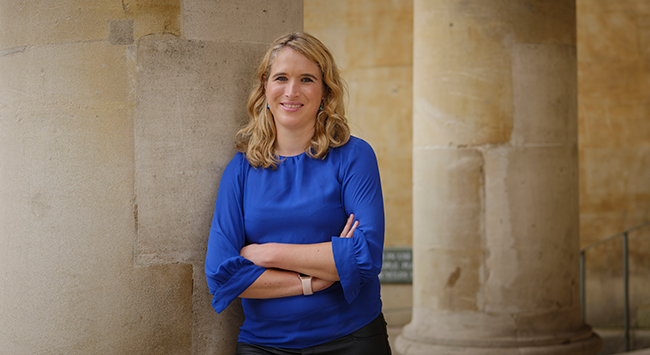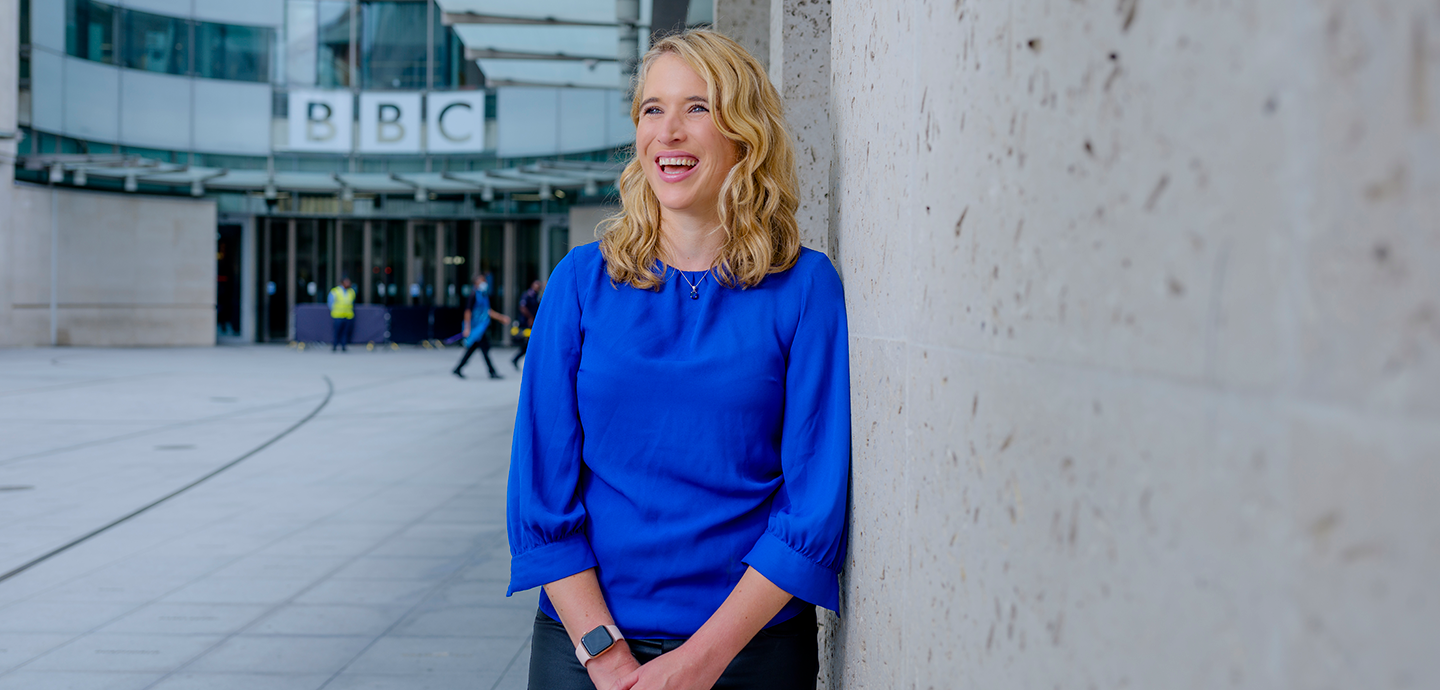22 October 2021
To mark International Stammering Awareness Day on 22 October, we’re sharing our interview with BBC News producer Felicity Baker, which was previously published in Bulletin, our members’ magazine.
Last year, for International Stammering Awareness Day, BBC News producer Felicity Baker tweeted in support. With a stammer of her own that she’d hidden all her life, Felicity’s tweet caught the attention of BBC newsreader Sophie Raworth. It was a short tweet, but one that ended up having a huge impact. In just six months, Felicity went from working behind the camera to fronting a documentary on primetime TV.
How did you open up about your stammer at work?
I’d been working very closely with the newsreader Sophie Raworth for the past year, but had never mentioned my stammer to her, or anyone else I worked with. I’d always thought of it as a private matter. But then last October, when I tweeted in support of International Stammering Awareness Day, Sophie saw the tweet and brought it up with me in conversation. At first I changed the subject, which is my typical reaction, but Sophie was persistent. She wanted to know all about my stammer, what my coping mechanisms were, how I managed to hide it… it was the first time I’d spoken to anyone about it outside of my family.
How did the documentary come about?
When I first joined the BBC, I promised myself I’d take every opportunity to raise awareness about stammering. When Joe Biden was elected, there was a lot of focus on the fact he had a stammer and it felt like a ‘now or never’ moment to keep that promise to myself.
Sophie and I put together a news report – my first where I’m on camera – which showed what it’s like to live with a stammer. It went out on the 6 o’clock and 10 o’clock news in January, around Biden’s inauguration.
There was an amazing reaction to the piece – literally thousands of messages from viewers saying how good it was to see something about stammering on mainstream news. We realised from the response that there was something more to be done. So, with a crew of five, we put together a half-hour programme called I Can’t Say My Name: Stammering in the Spotlight that showed the realities of living with a stammer.
You and Sophie swapped roles to make the programme: she went behind the camera and you fronted it. What was your reaction to being asked to do that?
I was absolutely terrified, firstly about being on-screen rather than behind it, and secondly about being so open about my stammer. But I was spurred on by the promise I’d made to myself when I first joined the BBC. Making it was a labour of love, although it took a huge adjustment for me to go from never talking about my stammer to talking about it publicly.
What did you feel it was important to tackle within the programme?
Whenever I’ve seen stammering portrayed in the media, it’s either been framed in terms of a ‘pity narrative’ – something that readers or viewers need to feel sorry about – or else in terms of ‘overcoming’ the stammer. But the reality is you never overcome a stammer, you just learn to manage it. In the programme, I wanted to portray the reality of stammering that others who stammered could relate to.
I also wanted to hear from people who stammer about what everyday life was like for them, as well as to highlight the unhelpful things that people say to those who stammer. For example, I was talking on the phone one time and struggling to say my name, and the person at the other end said, “have you forgotten it?”.
People who stammer aren’t stupid, they just need listeners to be more patient. They don’t need special treatment, they just need more time. Society puts such an emphasis on fluency and deems fluency to be the sign of a good communicator. All the people with stammers that I talked to in the programme were so eloquent and had achieved so much. Their stories really inspired me.
What’s been the response to the programme?
We had an amazing response, with total viewing figures of 4 million plus – much better than we anticipated. And we had thousands of letters and emails sent in, from people aged 11 to 88. It was also trending on Twitter. I had people messaging, saying “I’ve never spoken about my stammer before tonight” and that I was the first person they’d told. I’m still getting responses to the programme in July and we broadcast it in March. We had one message from a woman whose husband had burst into tears while watching it because he’d been hiding a stammer all his life. They sat down afterwards and he had his first conversation with her about it.

What did making the programme mean to you?
Stammering is a hidden condition. Making the programme brought home to me how stressful it is to have a stammer, and how much work goes into hiding it. I always use the swan analogy: while I might appear fluent on the surface, when I’m having conversations with people, I’m paddling madly away underneath the water. It’s hard work and exhausting.
I used to go out of my way to appear fluent, so I really understood the people I interviewed in the documentary when they were talking about doing the same. And while it wasn’t easy for me to make the programme, I had a good team around me and I’m proud that it has encouraged other people to speak out.
Have you ever had speech and language therapy?
Yes, from the age of 11. I had an amazing SLT who taught me breathing techniques and how to manage my stammer. She also taught me coping mechanisms and how to change the way I thought about my stammer. Although she’s retired now, we’re still in contact. She’s been there during the big moments of my life, such as starting work at the BBC.
I also took a residential course in my 20s, where I met some amazing people. The help I’ve had has been invaluable and I still use the techniques today that I’ve been taught.
A stammer isn’t something that’s magically cured, and I’ve had my ups and downs with it, but it doesn’t define who I am. In fact, learning to manage my stammer has made me stronger and has served to push me in lots of ways to achieve more.
Has making the programme changed anything for you?
I think the biggest change has come when I’m talking to people – I’ve taken the pressure off myself to hide the stammer. Rather than practising avoidance techniques, I’ve allowed myself to start stammering at work. My colleagues have been so supportive and I’m so grateful for that. I was working on the 1 o’clock news the other day and had to make a phone call. Normally, I’d go out into the corridor to make calls so nobody could hear me speak, but I decided to make this one in the office. I said to the editor, “I’m going to make a call and you might hear me stammer”, and she just said, “OK.” So I made the call in front of her, which was a very big thing for me.
I’ve been back to my old school to give an assembly about stammering. I got lots of letters afterwards from the girls there saying how I’d inspired them to really push for what they want to achieve. With a colleague from BBC Sport, I’ve also helped to launch an internal stammering support network for BBC staff. We’re going to be arranging events to raise awareness about stammering, and lots of people have come forward to join and offer their support.
How does it feel for your stammer not to be a secret anymore?
It feels liberating, I’ve grown more confident. And I’m not done – I’m going to continue speaking openly about it. I’m really proud of the programme, and I’m proud of being part of the stammering community. Making the programme felt quite overwhelming at times, but I’m so glad I did it. When I’m talking now, instead of substituting a word I find easier to say, I’ll say, “I stammer, I can’t say that word”, rather than practising avoidance techniques. It’s been really amazing.
What’s next for you?
I’d love to do more presenting! Because of the stammer, I’d never previously considered it, but I absolutely want to keep speaking out about stammering. There’s so much more that can be done and I’ll take every opportunity that comes my way, so watch this space!
Watch I Can’t Say My Name: Stammering in the Spotlight on BBC iPlayer.
Images: Peter Searle
Related content
Giving voice to stammering webinar
Watch the recording of our webinar
Dysfluency overview
Information and guidance on dysfluency and stammering
Stammering awareness posters
Download our posters to raise awareness

